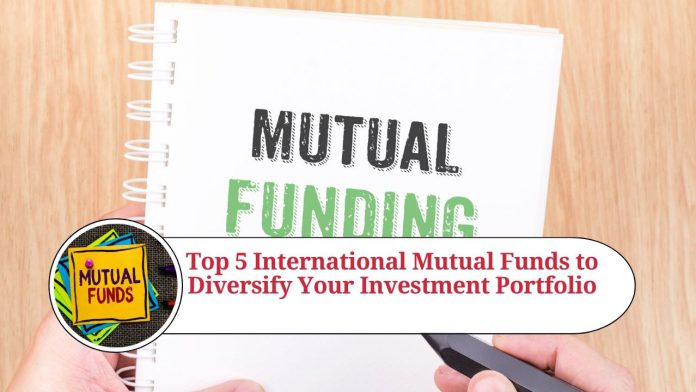Investing in international mutual funds is a great way to diversify your investment portfolio and potentially gain exposure to companies and markets that are not available in your home country. In this blog post, we will discuss the top 5 international mutual funds that are worth considering for your investment portfolio.
Vanguard Total International Stock Index Fund (VGTSX)
The Vanguard Total International Stock Index Fund invests in both developed and emerging market companies, making it a great option for investors looking for broad international exposure. With a low expense ratio of 0.11%, this fund tracks the FTSE Global All Cap ex US Index and provides exposure to over 6,000 stocks across 47 countries.
Fidelity International Index Fund (FSPSX)
The Fidelity International Index Fund is another great option for investors looking for broad international exposure. This fund invests in companies in developed countries outside the United States and has an expense ratio of 0.035%. It tracks the MSCI EAFE Index and provides exposure to over 1,000 companies in 21 countries.
T. Rowe Price Global Technology Fund (PRGTX)
The T. Rowe Price Global Technology Fund is a great option for investors looking to invest in the technology sector on a global scale. This fund invests in companies across the world that are involved in the technology industry and has an expense ratio of 0.79%. It has consistently outperformed its benchmark, the MSCI ACWI Information Technology Index, over the past few years.
American Funds Capital World Growth and Income Fund (CWGIX)
The American Funds Capital World Growth and Income Fund is a diversified fund that invests in both growth and income-oriented companies across the world. With an expense ratio of 0.68%, this fund has a long track record of consistent performance and provides exposure to a wide range of sectors.
T. Rowe Price Global Equity Fund (RPGEX)
The T. Rowe Price Global Equity Fund invests in companies across the world and has an expense ratio of 0.80%. This fund is actively managed and seeks to identify companies with strong fundamentals and growth potential. With a focus on large-cap companies, this fund provides exposure to some of the world’s largest and most well-established companies.
In Conclusion
International mutual funds can be a great way to diversify your investment portfolio and potentially gain exposure to markets and companies that are not available in your home country. These top 5 international mutual funds offer a range of investment options and have consistently delivered strong performance over the years. However, it’s important to do your own research and consider your investment goals and risk tolerance before investing in any mutual fund.
Read more useful content:
- How to invest in mutual funds
- All about mutual funds-types & importance
- The Power of SIP Investment in Mutual Funds
Frequently Asked Questions (FAQs)
Q: What are international mutual funds?
A: International mutual funds are investment funds that invest in companies and securities outside the investor’s home country. These funds provide investors with exposure to foreign markets and may invest in both developed and emerging markets.
Q: Why should I invest in international mutual funds?
A: Investing in international mutual funds can help diversify your investment portfolio and provide exposure to markets and companies that may not be available in your home country. International mutual funds can also provide opportunities for potential growth and higher returns.
Q: What are the risks associated with investing in international mutual funds?
A: Investing in international mutual funds involves risks such as currency risk, political risk, economic risk, and market risk. Currency risk refers to the risk that changes in exchange rates may negatively affect the value of your investment. Political and economic risks refer to the risks associated with political instability or economic uncertainty in the country or region where the fund invests. Market risk refers to the risk of fluctuations in the stock market that may negatively affect the value of your investment.
Q: What should I consider when choosing an international mutual fund?
A: When choosing an international mutual fund, you should consider factors such as the fund’s investment objective, investment strategy, past performance, expense ratio, and management team. You should also consider your own investment goals and risk tolerance.
Q: What is the difference between developed and emerging markets?
A: Developed markets refer to countries with mature economies and stable political systems, such as the United States, Japan, and most of Europe. Emerging markets refer to countries with less mature economies and political systems, such as China, Brazil, and India. Emerging markets are generally considered to be riskier but may offer higher potential returns.
Q: What is an expense ratio?
A: An expense ratio is the annual fee charged by a mutual fund to cover its operating expenses. The expense ratio is expressed as a percentage of the fund’s assets under management and includes expenses such as management fees, administrative costs, and other expenses related to running the fund.
Q: Are international mutual funds suitable for all investors?
A: International mutual funds may not be suitable for all investors, as they involve risks such as currency risk, political risk, economic risk, and market risk. Investors should consider their own investment goals, risk tolerance, and investment time horizon before investing in international mutual funds. It’s important to consult with a financial advisor before making any investment decisions.




















